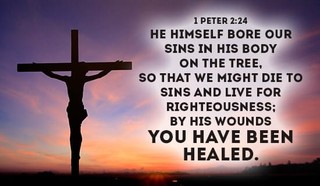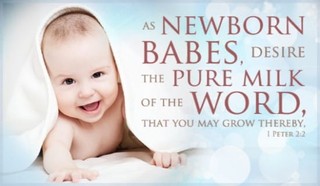
- Recent Translations
- All Translations
1 Peter 2:24
Share
Settings
1 Peter 2:24 Meaning and Commentary
Who his own self bare our sins
As was typified by the high priest bearing the sins of the holy things of the people of Israel, when he went into the most holy place, and by the scape goat bearing the iniquities of all the people unto a land not inhabited, and as was foretold by the Prophet Isaiah. The apostle here explains the nature and end of Christ's sufferings, which were to make atonement for sins, and which was done by bearing them. What Christ bore were "sins", even all sorts of sin, original and actual, and every act of sin of his people; and all that is in sin, all that belongs to it, arises from it, and is the demerit of it, as both filth, guilt, and punishment; and a multitude of sins did he bear, even all the iniquities of all the elect; and a prodigious load and weight it was; and than which nothing could be more nauseous and disagreeable to him, who loves righteousness, and hates iniquity: and these sins he bore were not his own, nor the sins of angels, but of men; and not of all men, yet of many, even as many as were ordained to eternal life, for whom Christ gave his life a ransom, whom he justifies and brings to glory; our sins, not the sins of the Jews only, for Peter was a Jew, and so were those to whom he writes, but of the Gentiles also, even the sins of all his people, for them he saves from their sins, being stricken for them. His "bearing" them was in this manner: he becoming the surety and substitute of his people, their sins were laid upon him by his Father, that is, they were imputed to him, they were reckoned as his, and placed to his account; and Christ voluntarily took them upon himself; he took them to himself, as one may take the debt of another, and make himself answerable for it; or as a man takes up a burden, and lays it on his shoulders; so Christ took up our sins, and "carried" them "up", as the word here used signifies, alluding to the priests carrying up the sacrifice to the altar, and referring to the lifting up of Christ upon the cross; whither he carried the sins of his people, and bore them, and did not sink under the weight of them, being the mighty God, and the man of God's right hand, made strong for himself; and so made entire satisfaction for them, by enduring the wrath of God, the curse of the law, and all that punishment which was due unto them; and thereby bore them away, both from his people, and out of the sight of God, and his vindictive justice; and removed them as far as the east is from the west, and made a full end of them; and this he himself did, and not another, nor by another, or with the help of another; not by the means of a goat, as the high priest, but by himself; though he was assisted in bearing his cross, yet he had no help in bearing our sins; angels could not help him; his Father stood at a distance from him; there was none to help; his own arm brought salvation to him; but
his own self,
who knew no sin, nor did any, he by himself purged away our sins, and made reconciliation for them, by bearing them: and which he did
in his own body,
and not another's; in that body which his Father prepared for him, and which he took of the virgin, and was free from sin; though not to the exclusion of his soul, which also was made an offering for sin, and in which he endured great pains and sorrows for sin: and all this
on the tree;
the accursed tree, the cross; which is expressive both of the shame and pain of his sufferings and death. The end of which was,
that we being dead to sin;
"to our sins", as the Alexandrian copy, and the Ethiopic version read; as all the elect are, through bearing their sins, and suffering death for them, so as that sin shall not be imputed to them; it is as though it never was; it is dead to them, and they to that, as to its damning power and influence; so as that they are entirely discharged from it, and can never come into condemnation on account of it, and can never be hurt, so as to be destroyed by it; nor by death, either corporeal or eternal, since the sting of death, which is sin, is taken away, and the strength of sin, which is the law, is dead to them, and they to that: in short, through the death of Christ they are so dead to sin, that it is not only finished, made an end of, and put away, but the body of it is destroyed, that it should not be served; which is an end subordinate to the former, and expressed in the next clause:
should live unto righteousness;
live, and not die the second death, and live by faith on the righteousness of Christ, for justification of life, and soberly, righteously, and godly in this present evil world; which the grace of God teaches, and the love of Christ in bearing sin constrains to, and the redemption by his precious blood lays under an obligation to do; for those whose sins Christ has bore are not their own, but being bought with the price of his blood, they are bound to live to him who has a property in them, and a right to claim all obedience from them:
by whose stripes ye were healed;
the passage referred to is in ( Isaiah 53:5 ) which is a prophecy of the Messiah, as is acknowledged by the Jews F7, who say F8,
``this is the King Messiah, who was in the generation of the ungodly, as it is said, ( Isaiah 53:5 ) "and with his stripes we are healed"; and for this cause God saved him, that he might save Israel, and rejoice with them in the resurrection of the dead.''Sin is a disease, a natural and hereditary one, an epidemic distemper, that reaches to all men, and to all the powers and faculties of their souls, and members of their bodies; and which is nauseous and loathsome, and in itself mortal and incurable; nor can it be healed by any creature, or anything that a creature can do. Christ is the only physician, and his blood the balm and sovereign medicine; this cleanses from all sin; through it is the remission of sin, which is meant by healing; for healing of diseases, and forgiving iniquities, is one and the same thing; see ( Psalms 103:3 ) ( Isaiah 33:24 ) ( Psalms 41:4 ) on which latter text a learned Jew F9 has this note,
``this interpreters explain (hxylo Nwvl) , "as expressive of forgiveness";''and the Jews say, there is no healing of diseases but it signifies forgiveness F11: it is an uncommon way of healing by the stripes of another. Some think the apostle alludes to the stripes which servants receive from their masters, to whom he was now speaking; and in order to encourage them to bear them patiently, observes, that Christ himself suffered stripes, and that they had healing for their diseases and wounds, by means of his stripes, or through his being wounded and bruised for them.
F7 Zohar in Exod. fol. 85. 2. Midrash Ruth, fol. 33. 2. Yalkut Simeoni, par. 2. fol. 53. 3. & 90. 1.
F8 R. Moses Haddarsan apud Galatin. de Areanis Cathol. Verit. l. 6. c. 2.
F9 R. Sol. Urbin Ohel Moed, fol. 64. 1.
F11 Yalkut Simeoni, par. 2. fol. 43. 1.


